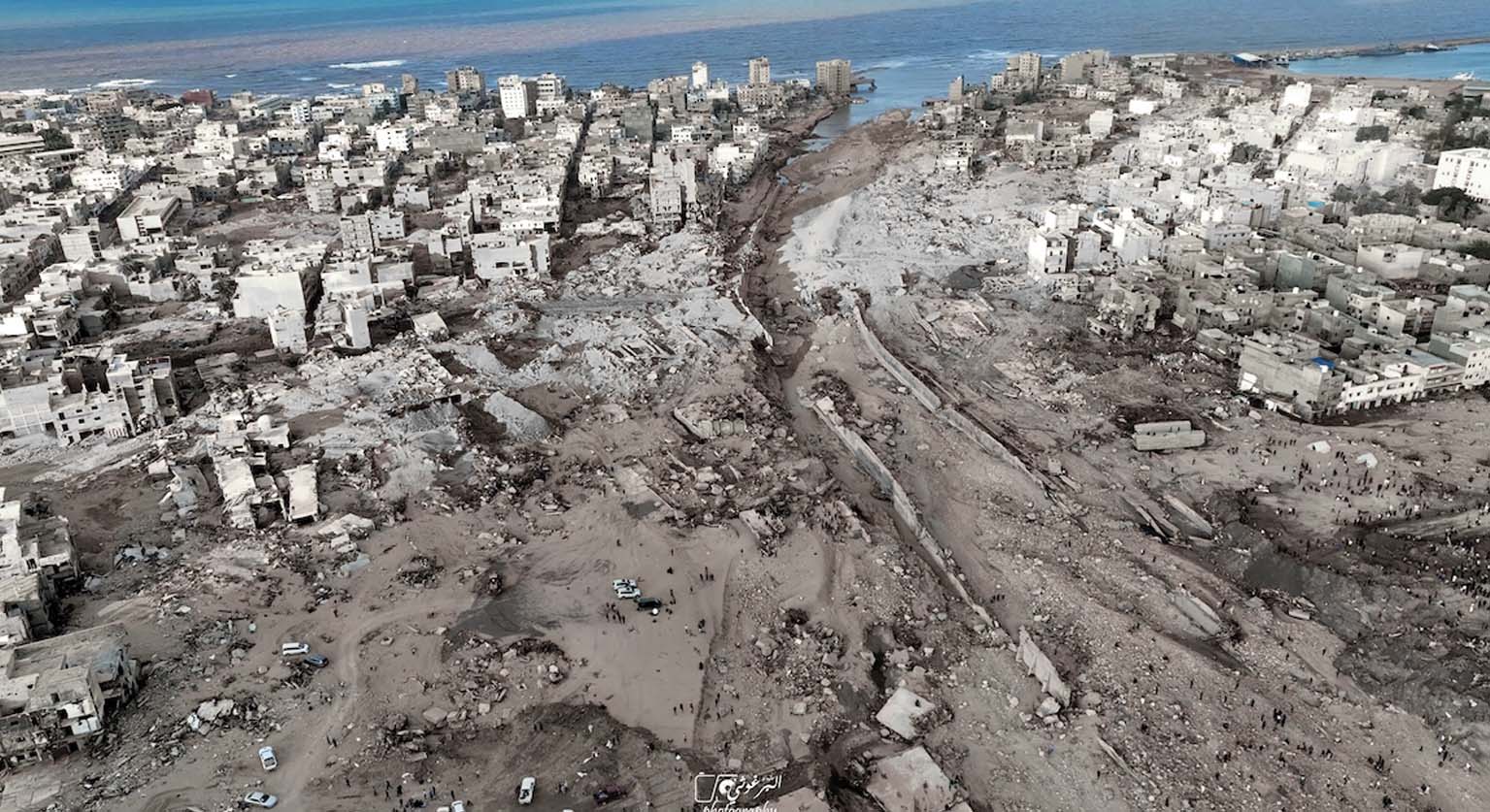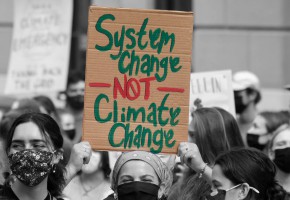

Derna Disaster in Libya - Ayat Mneina
On the evening of Sunday September 10 through to Monday September 11, 2023, Storm Daniel hit the North African coast of Eastern Libya, bringing with it rainfalls equivalent to amounts seen in one year (400 mm), in a matter of hours. In addition to the excess rain, two large dams leading into the city of Derna through its valley-Wadi Derna-, collapsed and unleashed 30 million cubic metres of water downstream into the city of Derna, population approximately 100,000. The floods resulted in the erosion of the banks of the valley, destroying a quarter of the city of Derna including its core downtown area. Water levels reached over 30 metres high and took entire buildings, houses and vehicles into the sea.
Two and a half weeks later and more than 4,000 bodies have been buried, 9,000 more remain missing and over 30,000 people have been displaced in the city of Derna alone. Other areas experienced flooding such as Susa, Shahat (Cyrene) and AlBeida.
To put into words the scale of devastation and destruction that the city of Derna and Eastern Libya have seen is nearly impossible. Entire neighbourhoods and streets were washed away in a matter of minutes in the dark. Entire families, generations of them and their histories, erased. Thousands may never learn the fate of loved ones as hope of finding any survivors long gone, the recovery of bodies now buried in the sea impossible, and many hurriedly buried in mass graves before DNA sampling could take place. Derna was struck with a flood nearly seven decades ago, its impact recorded in the memory of those who lived through it and in poetry and local culture but nothing could prepare this city, this country or anyone’s imagination for what Storm Daniel had in store.
And on the other hand, it is not the fault of climate change alone. In fact, the two large dams which were built in the 1970s above the city’s valley which splits the city in two, had been long overdue for maintenance. Decades of neglect, corruption and a political elite proficient only in kleptocracy has meant that despite the uprisings in 2011 which saw the end of the Gaddafi regime and its obvious failure to invest or repair critical infrastructure, the revolving door of authorities we have gained since have proven that they similarly do not care for Libya or its citizens.
In the aftermath of this national tragedy that will go down in history for its catastrophic scale, the city of Derna and the rest of Libya are still reeling from its impact. The Wadi Derna and the path that the flood torrents made roaring through it split the city in two and flattened the heart of the city including the old medina and souk, Libya’s first theatre, the city’s cultural centre, churches, a synagogue and mosques dating back centuries including the Sahaba Mosque which used to include the tombs of 70 companions of the Prophet Muhammad, also sadly washed away in the floods.
Personally, both my parents are from Derna, and my aunts and uncles on both sides still reside there today. As events unfolded, I watched from Canada, scouring Facebook, social media and Libyan television channels for any clues or coverage on what was happening on the ground. All our relatives went silent in the middle of Sunday night, many of them were reassuring us that it was only some rain, that everything would be fine, God willing. However, as the floods hit and communication lines went down, it would be hours before the first glimpses of the wreckage would surface. Looking at the destroyed banks of the Wadi, I could not fathom what had taken place that would so dangerously flatten the earth in its path. My heart sunk while watching live coverage on the television of the only Libyan channel which seemed to be covering the floods, a voice on the air interrupted the host and said, ‘Listen, entire buildings were swept into the sea. Derna is gone.’ The estimates of the death toll until that moment was cited to be at 150, now it spiked to 2,000. I was struck, my mind was still with the people of Morocco who had just suffered over 2,000 people during their devastating earthquake. I could not imagine that we had just suffered a disaster at a similar scale, surely there had been a mistake. I spent the next few hours refreshing my Facebook feed, waiting for a relative to post something, anything.
It wasn’t until 3:30 pm in Canada or 10:30 pm local time in Derna that one of my cousins posted that she had gotten through to my aunt and confirmed they were ok. News began to trickle in for the rest of the day (and night in Libya) and we began to learn of the horrific scenes that some family members experienced and of those loved ones we lost in the flood. Even today, we have yet to process all that has happened, it has been difficult for family within Derna to come together as the city has been split into two where the Wadi’s banks were destroyed. All but one major road into Derna was also washed away making it difficult for people to attempt to leave the city, for aid and journalists to enter the city.
Images of the destruction bled into images of emergency rescue missions and long lines of trucks carrying aid and volunteers from all parts of Libya rushing to help in any way they can. Unfortunately, official responses dampened many efforts because there was no coordination, no strategy and no political will to provide the response needed in this shocking reality. Authorities in various positions - thanks to Libya’s political divisions - spent the first few days claiming that Storm Daniel caused the collapse of the dams and climate change was to blame. After all, it was the will of Allah - leaning on the country’s strong faith to excuse themselves of any responsibility. They were slow to fly in and show their faces on the ground, all while the people of Libya were realising that the great loss they just suffered could have been prevented. Frustration, grief and anger were palpable a week after the floods, in front of the Sahaba mosque where hundreds of protesters gathered demanding for accountability naming Aguila Saleh, head of the House of Representatives and later setting fire to the house of the mayor.
Communication blackouts and confusion would be the theme for the next day when mixed messages surrounding a complete communication blackout would take place, with rumours that a line had been cut that needed repair that would later be debunked and the reality set in: authorities intentionally turned off comms to keep the people of Derna and the world in the dark about what was really happening on the ground. Detentions of protesters and an increase in security all around has meant that many journalists have wrapped up their work and left, many more are not able to get through the lengthy clearance process to enter the city and the same goes for aid organizations, both local and international. Authorities are intentionally drawing attention away from the city.
Politicians across the board are feeling exposed in the aftermath of this disaster and if the Libyan people are given the freedom to express themselves, to organize and assemble, politicians know their days are numbered. They will continue to do their best, no matter how brutal or violent they must react, to cling to power. Their stakes are too high - free reign and access to the country’s oil wealth, power and very little responsibility in exchange.
Facades of investigations are playing out in a charade right now while Prime Minister Abdulhamid Dbeibah likely attempts to embezzle what he can from this disaster and while military dictator of eastern Libya, Khalifa Hifter, is off visiting Russia, likely exploring how he can continue to stay in power and what favours or collateral he can exchange for continued support. The reality is very distressing and the Libyan people are not convinced that any accountability into this matter can happen at a national level, not with our questionable leaders in power and frail institutions including the justice system which has not delivered any justice to the long list of crimes, oppression and abuse the people of Libya have suffered to date.
Libyans are calling for an international inquiry and investigation into the circumstances around the flood and collapsing of the dams. Libyans are calling on international governments and partners who claim to stand for human rights and justice to step up and put pressure on Libyan authorities east and west to cooperate with an inquiry. Libyans deserve transparency, accountability and justice, or the thousands of lives lost will be in vain. And as U.N. Secretary-General Antonio Guterres began his address at the General Assembly on September 19, 2023, the world stands to learn from this as climate change will continue to put undue pressure on governments to prepare and act, “Derna is a sad snapshot of the state of our world -- the flood of inequity, of injustice, of inability to confront the challenges in our midst.”
A Derna resident expresses his grief at the end of an interview by describing his city as follows: “Derna. [Derna] the culture, the science, the literature, the culture, the arts, the theatre. Where is Derna? Derna the city of jasmine, the city of pomegranates. Where is Derna?!”
Ayat Mneina
Recent publications

ANND Newsletter January 2026 - From Davos to the UPR: Between Promises, and Accountability
Related publications

An Alternative progressive cycle and a revitalized multilateral system - Roberto Bissio

